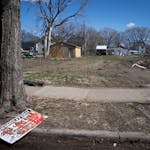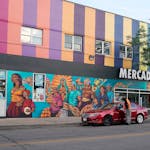Four Minneapolis police officers were fired Tuesday after the detention and death of 46-year-old George Floyd — a scene that unfolded in a Facebook video showing a white officer kneeling on Floyd's neck as he pleaded with police, "I can't breathe."
Floyd died at Hennepin County Medical Center soon after the encounter, which started when police detained him Monday evening on suspicion of trying to pass a fake $20 bill at a convenience store.
The FBI launched an investigation Tuesday, as the Minneapolis Police Department fired the officer as well as three others who were at the scene. The quick action didn't prevent a large protest Tuesday evening that included tense confrontations with police, who responded with tear gas.
"Being black in America should not be a death sentence," said a visibly shaken Mayor Jacob Frey, who said the officer used an unauthorized move against Floyd. "For five minutes, we watched a white officer press his knee into a black man's neck. Five minutes. When you hear someone calling for help, you're supposed to help. This officer failed in the most basic, human sense."
Police Chief Medaria Arradondo said he had stayed up all night wrestling with his decision to fire the officers. Arradondo said he couldn't say much about the case — either about the FBI's investigation or a parallel probe by the state Bureau of Criminal Apprehension (BCA) — but added that "sanctity of life" has always been a pillar of his department.
"What occurred last night was certainly very tragic, and very sad," he said in an afternoon news conference on the steps of City Hall.
Officials have not publicly named the four officers, but multiple sources identified the two prominently featured in the 10-minute Facebook Live video as Derek Chauvin, who was kneeling on Floyd's neck, and Tou Thao, who stood by as witnesses pleaded with the officers to let Floyd up and to check his pulse.
Arradondo said at an earlier news conference that he'd asked the FBI to take the case after watching the video of the encounter and receiving "additional information" about it from community members, without elaborating.
Community activist John Thompson says the images of Floyd and other black men across the country who have met unjust deaths at the hands of police trigger a kind of collective trauma within the black community.
"Let's be clear: This is murder," said Thompson, whose advocacy in the 2016 police killing of his friend Philando Castile catapulted him into a run for state office. "I don't want to be labeled the angry black man — I should be able to have that emotion. I'm angry. Wouldn't you be?"
Floyd's family has retained attorney Benjamin Crump, who also represents the families of Ahmaud Arbery and Breonna Taylor, a black man and woman killed in recent high-profile cases.
"This abusive, excessive and inhumane use of force cost the life of a man who was being detained by the police for questioning about a nonviolent charge," read the statement from Crump's office.
Chauvin is represented by Thomas Kelly, a Minneapolis attorney who was part of the legal team that successfully defended former St. Anthony police officer Jeronimo Yanez in the 2016 fatal shooting of Castile. Kelly declined to comment through a spokesman Tuesday.
Fatal chain of events
The arrest that sparked the fatal chain of events happened about 8 p.m. Monday, when police were called to investigate a report of someone trying to pay with a counterfeit bill at Cup Foods, 3759 Chicago Av., and found the man matching the suspect's description in his car, according to police and scanner audio posted online.
Cup Foods' owner, Mike Abumayyaleh, later confirmed that one of his employees had followed store policy by calling police after someone, thought to be Floyd, tried to pay with a counterfeit $20 bill. Abumayyaleh said he's been receiving death threats since then.
Officers ordered Floyd out of the car and took him into custody, police spokesman John Elder said, adding that their body cameras were rolling the whole time.
The arrest also was streamed by a bystander on Facebook Live, where the archived footage approached 1 million views as of Tuesday evening.
The video captures Chauvin with his knee on the neck of Floyd, who is lying face down on the street next to the rear passenger wheel, writhing, while repeatedly telling police he couldn't breathe as three officers hold him down.
"Please, please, please I can't breathe. Please, man," Floyd is heard pleading with the officers. At one point, he cries out for his mother.
By then, several other witnesses had gathered on the sidewalk outside of Cup Foods, with several recording the scene on their phones. "Bro, you've got him down, let him breathe at least, man," one bystander is heard telling police.
At one point, as a group of bystanders continue to plead for the officers to check Floyd's pulse, an officer, believed to be Thao, can be heard saying, "Don't do drugs, guys."
"So you call what he's doing OK?" one bystander asks, referring to Chauvin.
As Floyd begins to lose consciousness, the group of bystanders becomes increasingly agitated. Among them was a woman who identified herself as an off-duty firefighter and first responder.
"The fact that you guys aren't checking his pulse and doing compressions if he needs them — you guys are on another level!" she said.
Thao is then shown moving away from his colleagues to tell the crowd to "get back on the sidewalk." As he moves toward them, one of the bystanders points out that Floyd no longer seems to be moving.
A short time later, paramedics arrive and put him onto a gurney and into a waiting ambulance. Floyd was taken to HCMC, where he died at 9:25 p.m. The cause of his death is "pending further testing and investigation" by multiple agencies, according to the medical examiner.
No weapons were recovered from the scene, police said.
The footage doesn't capture what led to Floyd's arrest, only picking up after he has already been taken to the ground and is in handcuffs.
Darnella Frazier, who filmed and posted the encounter, told the Star Tribune that she started recording "as soon as I heard him trying to fight for his life" in front of her and other bystanders near the intersection of 38th Street and Chicago Avenue S.
"It was like a natural instinct, honestly" to start recording, said Frazier, who lives in the neighborhood. "The world needed to see what I was seeing. Stuff like this happens in silence too many times."
Later on Tuesday, Frey and Council Member Andrea Jenkins, who represents the ward where Floyd died, joined editors of traditional black publications North News and Insight News for an emotional 45-minute Facebook live session.
The conversation later turned to the MPD's initial news release that said Floyd died after a "medical incident," which sparked widespread criticism on social media that the department appeared to be downplaying his death.
Jenkins pointed out that the MPD has its own communications department and issues statements without vetting at City Hall.
"The statement that was put out was almost as harmful the perpetration of the act," Jenkins said. "We all watched that video — there were no medical concerns prior" to the officer putting his knee on Floyd.
Elder, the police spokesman, at first said that Floyd had gotten out of the car on his own, but "physically resisted" officers and was handcuffed, before officers noticed that he was in "medical distress." Elder later walked back some of those statements, saying they were based on preliminary information.
The technique used, he added, was not a department-authorized chokehold.
All body camera footage has been turned over to the BCA, which said in a news release that its investigation was separate from the FBI's civil rights investigation, and that it would turn over its findings to the Hennepin County Attorney's Office for possible criminal charges.
The racially charged death also threatened to reignite tensions between police and minority communities that reached a boiling point in 2015 after the fatal shooting of Jamar Clark and a weekslong protest outside a nearby police station that followed.
Nekima Levy-Armstrong, a prominent local voice on police reform who was a fixture at those protests, said that for all the gains that people of color have made, deaths like Floyd's are another reminder that the system remains stacked against them.
"It just reminds me of Eric Garner once again: a black man being accosted by police and pleading for his life saying he couldn't breathe," she said, referring to an unarmed New York man who died in 2014 after being placed in a police chokehold. "I'm fully convinced that if police wouldn't have been called to the scene, then he would still be alive."
Staff writers Chao Xiong, Miguel Otárola, Rochelle Olson, Liz Sawyer, Randy Furst, Paul Walsh, Andy Mannix and Ryan Faircloth contributed to this report.



